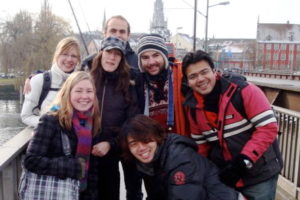Earlier on this blog I’ve talked about the evidence that the Syrian civil war needs to be understood in the context of a devastating drought, and the government’s inability to respond effectively. What is chilling, however, is what global warming entails for the entire Middle East and northern Africa. The recent Washington Post article by Hugh Naylor, “An epic Middle East heat wave could be global warming’s hellish curtain-raiser,” is a thought-provoking look at what this future might entail. In some respects, the future is already here in that nations in the region are experiencing record high temperatures, and a heat index that has reach 140 degrees in the UAE and Iran. Unfortunately, I no longer think that we can talk about preventing the worst aspects of global warming. It’s too late. The reality is that not only is global warming taking place, but also that the global community has waited too long to respond. The world is committed to a long course of climate change and sea level rise that will endure for centuries. Some of the arguments in Naylor’s piece are chilling: “A study published by the journal Nature Climate Change in October predicted that heat waves in parts of the Persian Gulf could threaten human survival toward the end of the century.” Of course, this will entail the massive migration of people from this region to Europe and Asia. Still, it would be a mistake to focus only on this region in isolation. Climate migration will be a key social, political and economic factor in global affairs not only for the lifetime of everyone who reads this piece, but also for their grandchildren. The impact will be particularly devastating in some areas, such as the cities of the Chinese coast, many of which (like Shanghai) will be largely flooded. In the United States, Zillo is trying to calculate impact the economic impact of rising seas to Florida. …
We must face the new truth of global warmingRead More »


